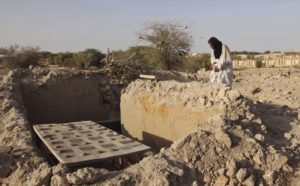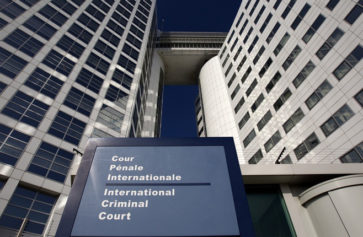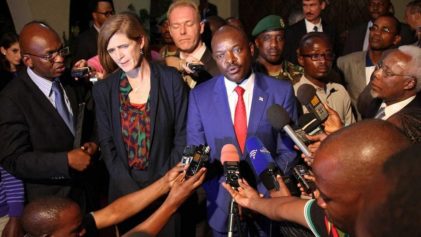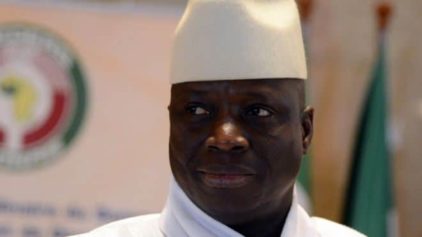
Mohamed Maouloud Ould Mohamed, a mausoleum caretaker, prays at a damaged tomb in Timbuktu, Mali. (AP Photo/Baba Ahmed, File)
BRUSSELS (AP) — The International Criminal Court ruled Thursday that a Muslim radical found guilty of destroying World Heritage cultural sites in the Malian city of Timbuktu must pay 2.7 million euros ($3.2 million) in reparations.
The court in the Netherlands found that Ahmad Al Faqi Al Mahdi had intentionally directed attacks against nine mausoleums and a mosque door in 2012, and ordered him to pay for damage to the buildings, economic losses and moral harm to victims — primarily the people of Timbuktu, who depend on tourism.
At previous hearings, Al Mahdi pleaded guilty and expressed remorse for his role in leading the destruction, urged Muslims around the world not to commit similar acts and was sentenced to nine years in prison.
Al Mahdi led pickax-wielding rebels who wrecked the simple mud-brick mausoleums covering the saints’ tombs in June and July 2012 in the famed African city. The sites that were attacked — all but one of them on the World Heritage list — were built during the 15th and 16th centuries at a time when Timbuktu was considered a great center of Islamic learning.
Prosecutors said Al Mahdi was a member of Ansar Dine, an Islamic extremist group with links to al-Qaida that held power in northern Mali at the time. The militants were driven out after nearly a year by French forces, and those troops arrested Al Mahdi in neighboring Niger in 2014.
The court also ordered Al Mahdi to pay the symbolic sum of one euro ($1.17) to Mali and one euro to the international community via UNESCO, which is responsible for World Heritage site cultural listings.
While it acknowledged that he is poor, the court called the reparations “reasonable” and said the burden of paying would not make it impossible for him to reintegrate into society. It encouraged a trust fund set up for victims to help pay the damages.
The ICC said the destruction of cultural monuments like those in Timbuktu “carries a message of terror and helplessness. (It) destroys part of humanity’s shared memory and collective consciousness, and renders humanity unable to transmit its values and knowledge to future generations.”


